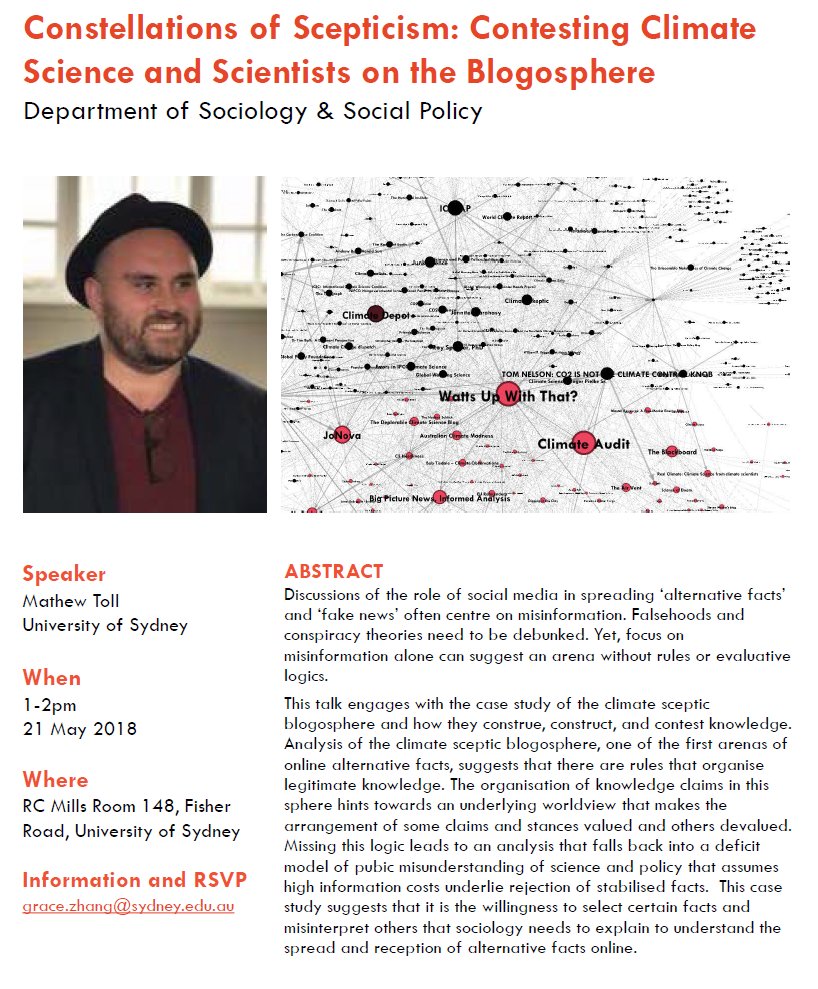Tuesday, July 3, 2018
SSPS Magazine article on S-Club
I had short article for the SSPS Magazine published about S-Club, a data analysis workshop with the LCT Centre for Knowledge-Building. You can find it: here.
Sunday, April 29, 2018
Friday, April 20, 2018
Next Talk: Department of Sociology and Social Policy, Seminar Series
Title:
Constellations
of Scepticism: Contesting Climate Science and Scientists on the Blogosphere.
Abstract
Discussions
of the role of social media in spreading ‘alternative facts’ and ‘fake news’
often centre on misinformation. Falsehoods and conspiracy theories need to be
debunked. Yet, focus on misinformation alone can suggest an arena without rules
or evaluative logics. This talk engages with the case study of the climate
sceptic blogosphere and how they construe, construct, and contest knowledge.
Analysis of the climate sceptic blogosphere, one of the first arenas of online
alternative facts, suggests that there are rules that organise legitimate
knowledge. The organisation of knowledge claims in this sphere hints towards an
underlying worldview that makes the arrangement of some claims and stances
valued and others devalued. Missing this logic leads to an analysis that falls
back into a deficit model of pubic misunderstanding of science and policy that
assumes high information costs underlie rejection of stabilised facts. This case study suggests that it is the
willingness to select certain facts and misinterpret others that sociology
needs to explain to understand the spread and reception of alternative facts
online.
Friday, March 16, 2018
LCT Roundtable: Explanatory or Axiological Power? Determining the Basis of Cosmologies in Janus-Faced Discourses
 |
| Day of the talk. (Photo credit: Kirstin WIlmont) |
I have another LCT roundtable coming on - 23rd of March, 2018.
Title:
Explanatory or Axiological Power?
Determining the Basis of Cosmologies in Janus-Faced Discourses
Abstract: This roundtable will explore
criteria to determine if explanatory power or axiological power is the finial
basis for the selection and organization of knowledge practices on the climate
sceptic blogosphere. Climate sceptic
bloggers frequently engage in political and policy discussion yet insist that
the core problem of climate science and policy is the weakness of the empirical
and conceptual underpinnings of the anthropogenic global warming
hypothesis. Explanatory power is
presented as the basis for legitimacy in climate science and climate politics,
yet there is a case that the code matching of contrarian position with the
mainstream position on climate science serves as a basis to contest
knowledge-building and delay policy action (Toll, 2017). Glenn (2016) found
that representatives from think-thanks who opposed carbon pricing did so on
explicitly for ideological reasons – free market and libertarian ideals.
Climate sceptics bloggers explicitly engage with the social science literature
and reject these kinds of ideology driven explanations of their position and
knowledge practices. On the blogosphere, the organizing principles of the climate
sceptic cosmology are obscured and sensitivity needs to be paid to the
construction of their epistemological and axiological constellations and how
various elements are selected and evaluated. Constellation analysis reveals tendencies that
suggest axiological power and not explanatory power is the basis of climate
sceptic bloggers’ cosmologies.
References.
Glenn, E. (PhD, 2016) From Clashing to Matching: Examining the legitimation codes that underpin shifting views about climate change, Institute for Sustainable Futures, University of Technology Sydney, Australia.Toll, M. (2017) Hyper-knowledge codes: Contesting knowledge-building on the climate sceptic blogosphere, Second International Legitimation Code Theory Conference, Sydney, Australia, July.
Subscribe to:
Posts (Atom)
-
I printed off a copy of my honours thesis , Discerning Knowers: An Exploratory Study of University Students' Perceptions of Knowled...
-
During his trial Socrates argued that human wisdom came from the acknowledgment of human ignorance (Plato, 1969, P. 52), a position arr...
-
A short Goodreads Review of Sun and Steel by Yukio Mishima that I wrote a little while ago. I have to say – I do not quite get the adorat...
-
In the social sciences, the selection of research design and its constituent elements is an important phase of the research process. T...
-
During a lecture before the Eugenics Society in 1937, British economist John Maynard Keynes stated that “a greater cumulative increment...
-
Western Marxism has often laid considerable stress upon the ideology of modern capitalist societies. This focus upon ideology stems from ...
-
At the dawn of the 20th century large colonial powers had carved up the world between themselves. ‘Core’ zones were marked by their lev...
-
In the 1832 Report of the Colebrooke Commission , Mr. C.H. Cameron outlined his view that Ceylon represented: “the fittest spot in our Ea...
-
E.P. Thompson’s The Poverty of Theory is a critique of Louis Althusser’s structuralist interpretation of Marxism and it’s relation to d...










